Britain has now entered an official heatwave with temperatures set to hit 32C today as health warnings were issued for babies, the elderly and other vulnerable people.
The mercury has steadily risen in recent days with highs of 25.2C (77.4F) last Sunday, 26.7C (80.1F) on Monday, 27.9C (82.2F) on Tuesday and 29.3C (84.7F) yesterday.
Now, thermometers are set to reach 32C (90F) today – which will be the hottest day of the year so far – before similar highs tomorrow and then 33C (91F) on Saturday.
Friday and Saturday nights will be uncomfortable for sleeping, with temperatures possibly staying above 20C (68F) in places, which is known as a ‘tropical night’.
The heatwave is likely to officially end after Saturday, but the weather from Sunday into the middle of next week will stay warm with a range of 24C (75F) to 26C (79F).
Yellow heat-health alerts from the UK Health Security Agency (UKHSA) for most of England will run until Sunday evening after being activated at midday yesterday.
The Government alerts warn of an increased use of healthcare services by vulnerable people and cover all regions of England apart from the North East and North West.
An official heatwave is recorded when areas reach a certain temperature for three days in a row, with thresholds varying from 25C (77F) to 28C (82F) in different areas.
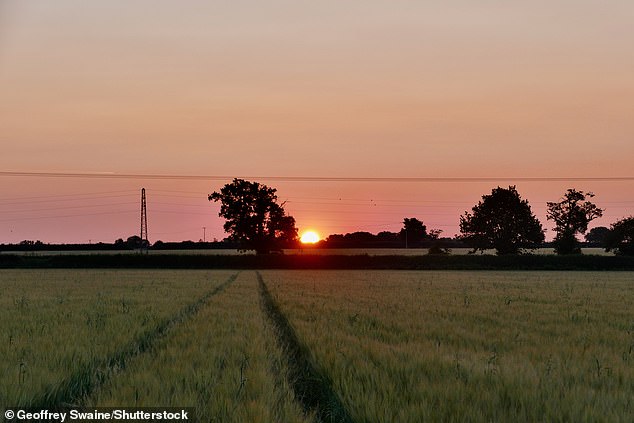
Sun rise on a warm morning in the Oxfordshire countryside at Dunsden today
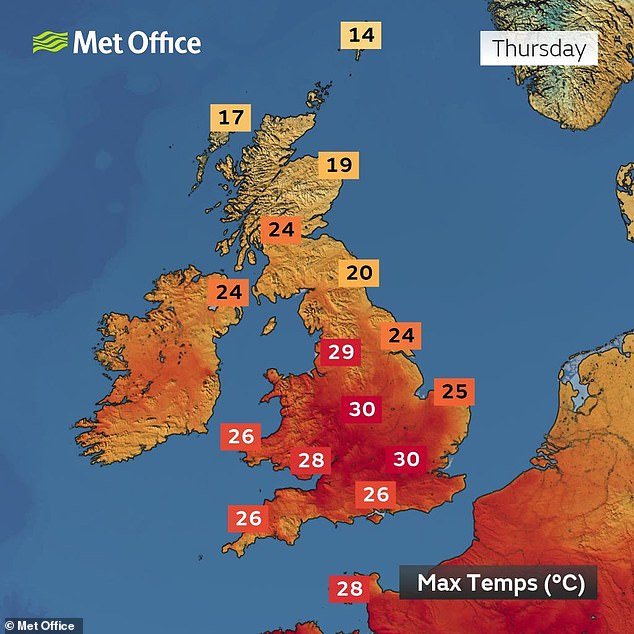
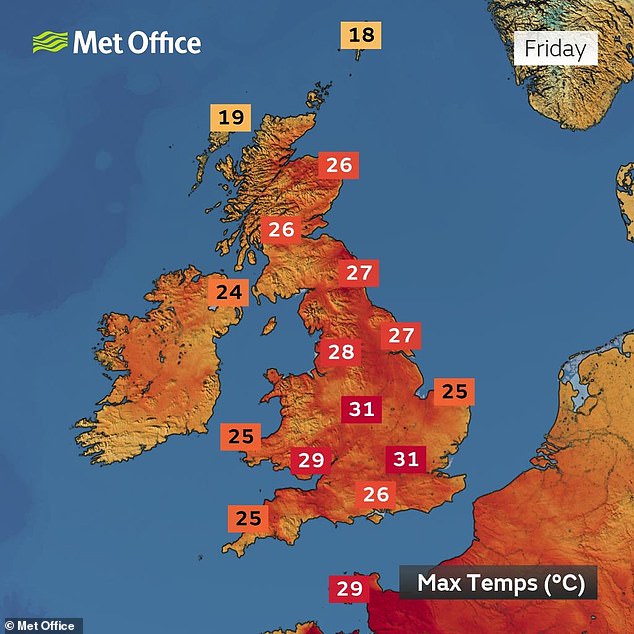
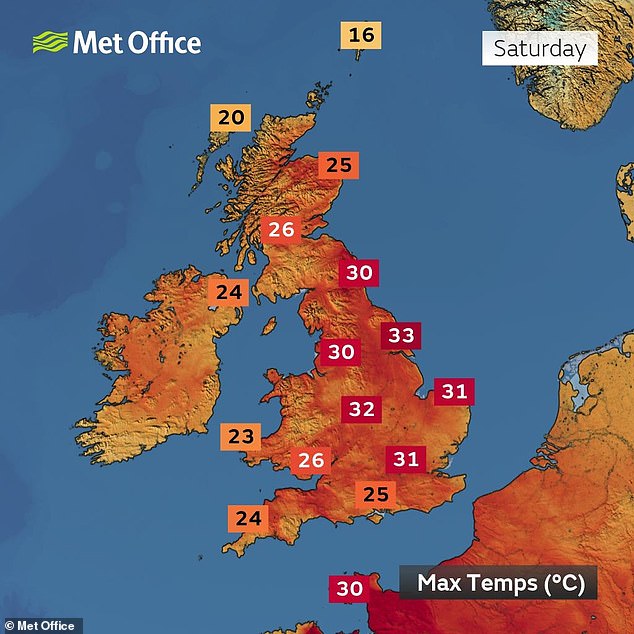
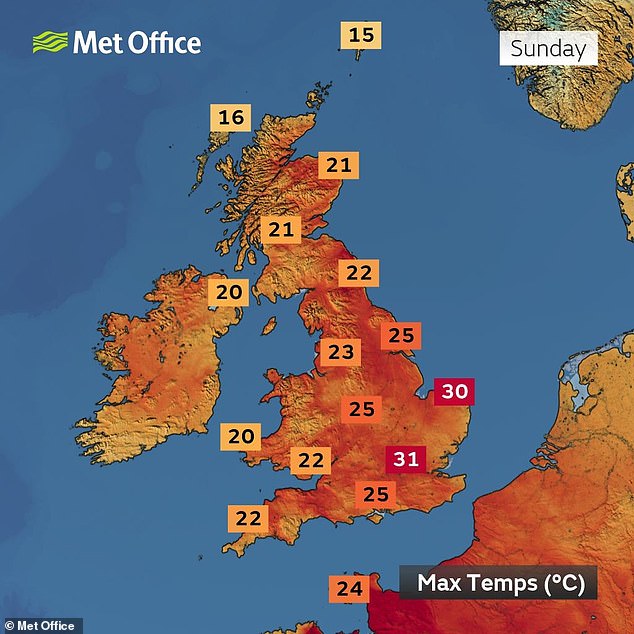
The current warmest day of 2025 so far was last Friday when temperatures reached 29.4C (84.9F) at Santon Downham in Suffolk. That broke the previous record for the year which stood at 29.3C (84.7F), recorded on May 1 at Kew Gardens in London.
But records are unlikely to be broken this week for the UK’s highest temperature in June, which was 35.6C (96.1F) in Southampton during the famous heatwave of 1976.
Meanwhile charities have issued warnings during this week’s hot weather – with the British Heart Foundation encouraging people with heart conditions to minimise potential health risks.
The charity’s senior cardiac nurse Ruth Goss said: ‘You can be at greater risk from the heat if you have a heart condition, as high temperatures can put extra strain on your heart.
‘Elderly people and very young children have more difficulty regulating their temperature and so can be more at risk from extreme temperatures.
‘In hot weather, check on your friends and relatives regularly to make sure they are cool and comfortable.
‘The most important way you can protect your heart in the heat is to stay cool and keep hydrated.’
In addition, Age UK has urged people to check in on older relatives, friends, and neighbours to see if they need anything and to make sure they are not feeling overwhelmed by the excessive heat.
Caroline Abrahams, its charity director, said: ‘The heat is expected to build during the week, becoming hottest at the weekend and as temperatures rise, those with long-term health conditions impacting their heart, lungs or kidneys can be at extra risk.
‘Generally, our bodies find it harder to adapt to more extreme temperatures as we age. Heat exhaustion, dehydration, and heat stroke can all worsen certain conditions, increasing strain on the body, and some medications make us more susceptible to hot weather.
‘At Age UK, we want older people to be able to enjoy the sunshine while taking care, so when the weather is really hot, it’s a good idea to take some simple precautions such as staying out of direct sunlight and drinking lots of water to stay hydrated.
‘It is also worth doing any daily activities, such as going for a walk, shopping, or gardening, before or after the hottest part of the day, which is 11-3pm.’
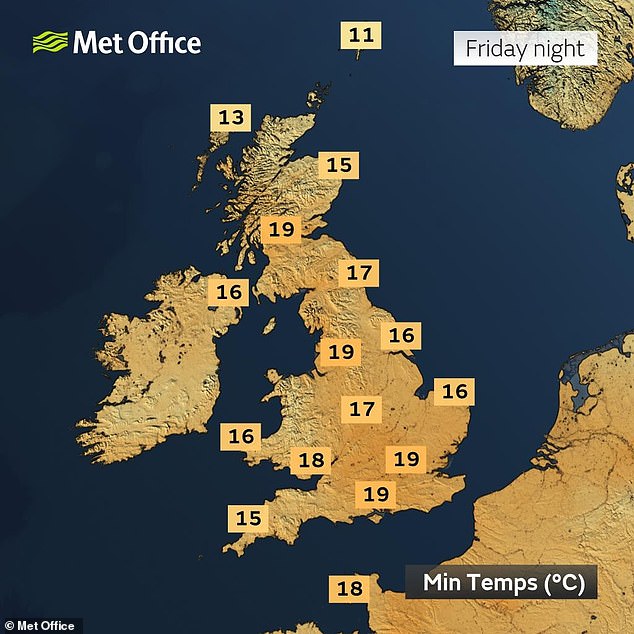
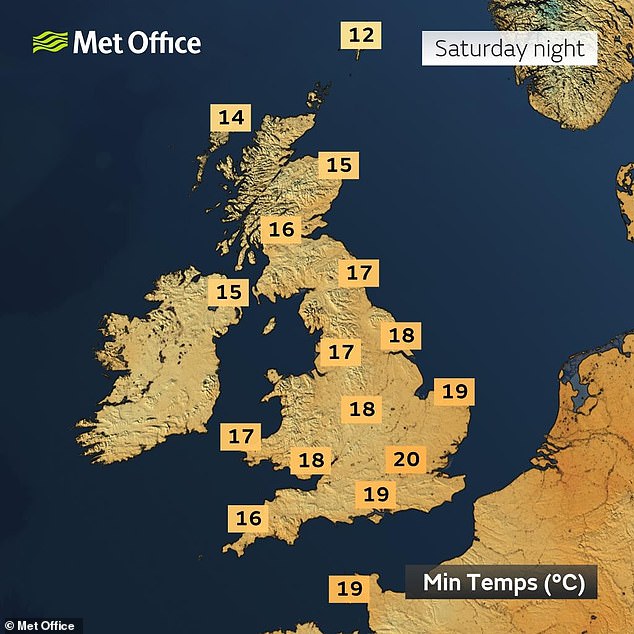
The Alzheimer’s Society is urging people to check in on friends and family living with dementia to make sure they stay safe during the hot weather.
Angelo Makri, senior knowledge officer for wellbeing at Alzheimer’s Society, said: ‘People should absolutely enjoy the nice weather we’re having.
‘However, it’s important to note that high temperatures can lead to severe health problems for people with dementia unless they take precautions to keep cool and well-hydrated.’
Dementia UK has also issued advice and tips on how to support a loved one with the dementia.
These include: keeping hydrated; staying cool with appropriate clothing; keeping the person out of the heat; cooling the person down by avoiding hot drinks, alcohol and caffeine; and keeping the home environment cool.
Met Office deputy chief meteorologist Dan Holley said heat is the ‘dominant story’ this week and temperatures will reach heatwave levels in parts of the UK.
He said: ‘Saturday is expected to be the peak of this hot spell, with temperatures fairly widely reaching into the low 30Cs across parts of England, with high 20Cs likely as far north as northern and eastern Scotland.
‘It will also be very warm at night over the weekend, with the potential for a few places to experience a ‘tropical night’, when temperatures do not drop below 20C.’
Some thundery showers could be seen in northern and western areas on Friday and into the weekend, before fresher conditions arrive later in the weekend and into next week, resulting in temperatures falling and potentially more unsettled weather, the forecaster added.
Kate Nicholls, chief executive of UKHospitality, said the hotter weather will be a ‘welcome lift’ for the hospitality sector.
She said: ‘This spell of warm weather will no doubt be a welcome lift for hospitality venues up and down the country, as people look to eat, drink and socialise outdoors.
‘Businesses will now be hoping for a strong summer to help counterbalance the significant cost pressures they’re contending with. Rain or shine, I’d encourage everyone to get out and support their local hospitality businesses.’
Katy Alston, who has been in the ice cream trade for more than 20 years and runs Pinks Parlour near the beach in Bognor Regis, West Sussex, said this week’s weather will be ‘the difference between night and day’ for her business.
She said: ‘We get so excited because this is what we wait for. People who work in ice cream vans are risk takers because you never know when that big yellow ball is going to come out.’
Ms Alston said on Tuesday morning she had 84 inquiries from businesses wanting an ice cream van to visit, which is more than the last month.
‘We want to go to as many people as we can,’ she said. ‘We’re now making gelato around the clock, as fast as we’re making it, we’re selling it. It’s our Christmas time.’
Meanwhile, the London Fire Brigade (LFB) has issued a warning over wildfires before the prolonged spell of hot weather and following one of the driest springs on record.
The LFB has attended more than 280 water-related incidents this year so far, an increase of about 15 per cent compared with the same period in 2024, it said.
They have included incidents such as sinking and capsized boats, individuals trapped in mud or caught by the tide, and people and animals in distress in the water.
Fifteen incidents resulted in people drowning in London, the fire brigade said.
As part of a national push during Drowning Prevention Week, LFB is increasing engagement with communities to raise awareness of water safety risks.
During a visit to Kingston Fire Station last week, Liberal Democrat Leader Sir Ed Davey met local firefighters and observed a live demonstration of the brigade’s river flume tank.
The tank includes a hydraulic flume with a range of features such as bridges, rocks and weirs to demonstrate how water behaves in rivers.
Since its introduction at Twickenham Fire Station last year, the tank has been used across London to show schools, youth groups, communities and stakeholders how even experienced swimmers can quickly get into difficulty in open water.
Pam Oparaocha, assistant commissioner for prevention and protection, said: ‘We’re working closely with MPs, schools and local communities to help people understand the serious water safety risks as summer approaches.
‘With warm weather and school holidays on the horizon, we want people, especially young people, to enjoy our waterways safely, and that starts with education.
‘Strong currents, underwater hazards and cold water shock can be deadly. It’s important to know the risks and to familiarise yourself with lifesaving equipment like throwlines, which are available along many of London’s waterways. There’s a wealth of guidance on our website to help people stay safe this summer.’
Jules Pipe, deputy mayor for the fire service, said: ‘London’s rivers, lakes and waterways can look very appealing when the temperatures rise, however, they can contain hidden dangers.
‘The mayor and I are working to improve the capital’s waterways for everyone to enjoy, and I urge everyone to heed London Fire Brigade’s advice to stay safe in and around water.
‘As the hot weather continues and with the summer holidays looming, this timely work with young people will help save lives and build a safer London for everyone.’
Issuing a BBQ warning, Ms Oparaocha added: ‘With hot weather comes the temptation to host BBQs or to head out to one of London’s many open spaces to enjoy the sunshine. However, it is important to make sure you are doing so safely.
‘We’ve had the driest spring in over a century, and the result is a heightened risk of grass fires, while the dry weather also means that fires can spread more easily.
‘If you’re out in the park or at an open space, please don’t take a disposable BBQ with you, make sure that smoking materials are discarded of properly and either dispose of your rubbish in the appropriate bins or take it home with you if none are available.
‘If you’re having a BBQ at home, avoid doing so on a balcony and ensure your BBQ is away from flammable materials like fences and sheds. You should also avoid having your BBQ on any decking you may have in your garden.’












